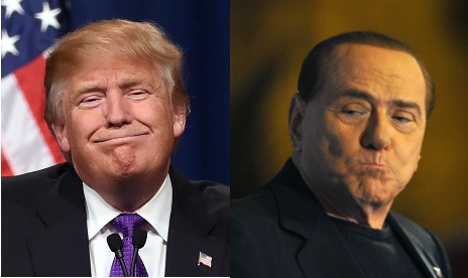Just when it seemed that ex-premier Silvio Berlusconi had become too irrelevant to poke fun at, another gaffe-prone leader with bizarre hair and orange skin has popped up.
And Italians are enjoying a laugh – sort of – about the similarities between the two business billionaires turned masters of populist politics.
“Americans, you've elected Donald Trump: Welcome to the Berlusconi experience,” was how Naples-based satirists The Jackal put it in a video that has gone viral on social media this week.
The clip, a compilation of Berlusconi's sexist jokes, diplomatic blunders and general buffoonery concludes on a sombre note: “The only difference is that Trump has got the nuclear codes.”
READ MORE: Six ways Donald Trump is eerily similar to Berlusconi
Under the hashtag Trumposconi, Twitter-wits meanwhile have been having fun photo-shopping Trump's bouffant hair onto Berlusconi's cosmetically-tightened face.
Beyond the perma-tans and the questionable coiffures, many of the things the US president-elect and the former three-times Italian prime minister have in common are also the things that have made them such controversial figures.
They both head opaque business empires that generated enough cash to finance their successful switches into politics in later life.
Locker-room bragging
The tax affairs of both men have been subject to scrutiny: Trump says paying none “makes me smart” and refuses to release his returns. Berlusconi was found guilty in 2013 of fiscal fraud, a conviction that effectively ended his political career.
Despite their own wealth and extravagant lifestyles, both present themselves as comfortable with and champions of ordinary people, as outsiders untainted by the perceived failures of established elites.
Both are resolutely politically incorrect and have appeared at times to lack a self-restraint switch.
Trump had no problem mocking a disabled reporter. Berlusconi once likened a political rival to a concentration camp guard.
And as The Economist noted this week, the pair share “a fondness for locker-room bragging and, while protesting their love of women, seem to judge them solely on their physical attributes.”
Trump boasted of grabbing women by their genitals. Berlusconi once dismissed German Chancellor Angela Merkel as “an unscrewable lard-ass,” and liked to organize “bunga bunga” sex parties with lavishly rewarded young women.
Both are twice-divorced. Berlusconi at age 80 lives with a girlfriend 50 years his junior; Trump, 70, is now married to former model, Melania, 46.
Both have been insulting to Barack Obama: Trump questioned the outgoing president's American-born credentials, Berlusconi has joked about him having “a good tan”.
QUIZ: Silvio Berlusconi vs. Donald Trump – who said it?
All of which is no laughing matter for those who regard the Berlusconi years as having exposed Italy to international ridicule while he delivered on few, if any, of his promises.
Crying wolf
Under the media tycoon, Italy's economy barely expanded, a chronic debt crisis worsened and the overall tax burden grew as he failed to implement long-overdue structural reforms.
He was ultimately ushered out of office with a Greek-style financial crisis looming in Italy.
John Foot, a professor of Italian history at Bristol University, said Berlusconi had tarnished democracy with his own brand of “post-fact politics” some 20 years before Trump.
“The lesson for America is that for far too long Berlusconi was treated as a joke and a clown,” Foot wrote in the Guardian.
“By the end, nobody was laughing. Twenty years of Berlusconi at the centre of the system had a deeply damaging impact on Italy's body politic and democratic culture and the wounds are by no means healed.”
But Giovanni Orsina, a professor at the LUISS university in Rome, suggests a different conclusion can be drawn: that democracy is more resistant to the challenge posed by successful populism than some might suggest.
“People cried wolf after Brexit, now they are crying wolf about Trump. But us Italians have not been afraid of the wolf since Berlusconi came to power,” Orsina said.
“It was said at the time it would be the end of democracy but even if Berlusconi was a disaster in many ways, that is not actually what happened.”
By Angus MacKinnon and Franck Iovene



 Please whitelist us to continue reading.
Please whitelist us to continue reading.
Member comments